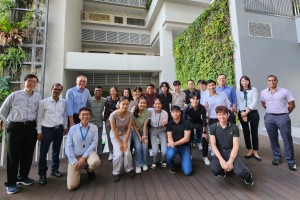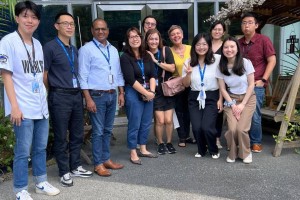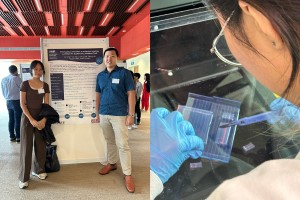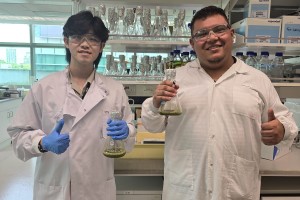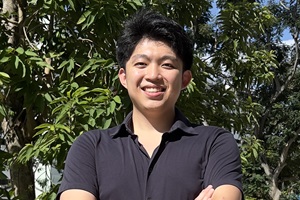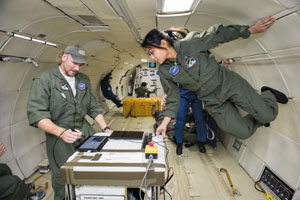Why BMS?
- An established biomedical science programme that prepares you for further studies and careers in medicine, biomedical research, allied healthcare, data analytics, medical technology, and biotechnology
- Specialise in one of three unique tracks to enhance your career prospects: Medical Bioscience, Clinical Laboratory Science, or the Integrated Clinical Training Programme
- Work on real-world capstone projects at the National Cancer Centre Singapore or embark on the one-year training at Singapore General Hospital , learning directly from leading healthcare professionals
About BMS
Curious about how the human body works? Dream of making groundbreaking discoveries in medical science? The Diploma in Biomedical Science (BMS) offers a comprehensive and dynamic curriculum that builds both theoretical knowledge and practical laboratory skills.
Through hands-on training, industry-relevant projects, and real-world internships, you’ll get a head start when you enter the workforce as a competent biomedical science professional.
Whether your passion lies in healthcare, biomedical research, biotechnology, or medical technology, our programme opens doors to a wide range of exciting career pathways.
What’s more, the curriculum lays a strong academic foundation for further studies in fields such as medicine, dentistry, chemistry, life sciences, biological sciences, and more — both locally and overseas.
With BMS, you will establish a solid foundation across multiple disciplines critical to the understanding of human health and disease. You will gain in-depth knowledge of cell and molecular biology, human anatomy and physiology, and biochemical processes within living organisms including disease mechanisms, as well as immune system responses. You will also be trained in essential laboratory techniques, research methodologies, and data analytical skills.
Additionally, you will gain cutting-edge skills in programming and artificial intelligence – key areas of growth in biotechnology, medical technology, and healthcare.
In your second year, you can choose one of three unique tracks to deepen your skills and knowledge in a specialised area:
1 Diploma, 3 Specialised Tracks
Rotate phone for better user experience
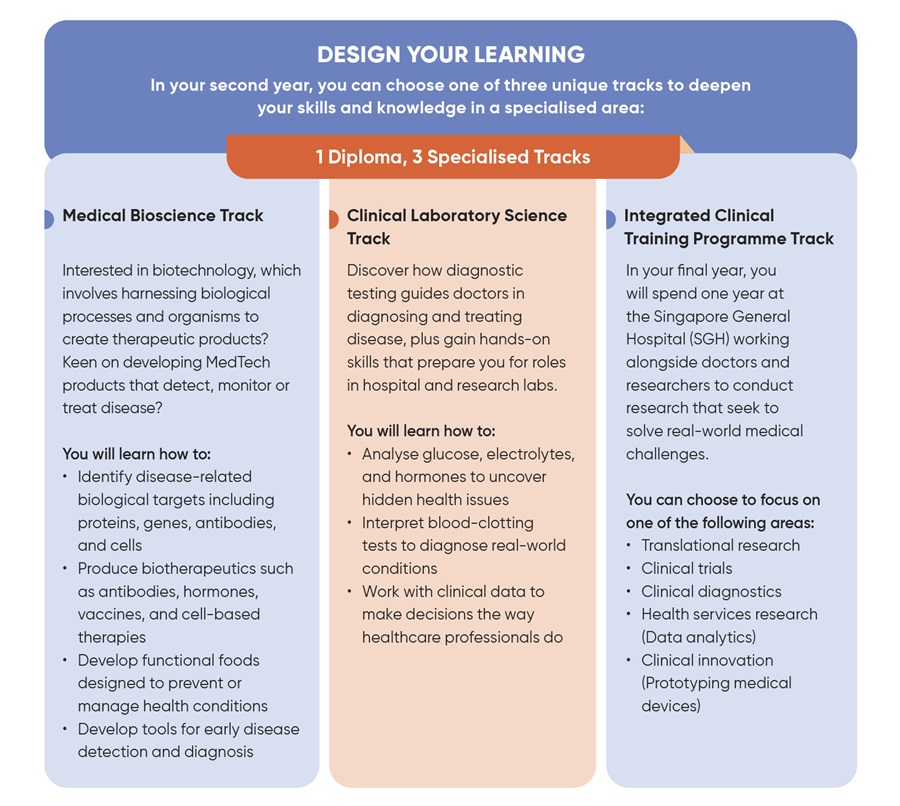
Overview of Your BMS Journey
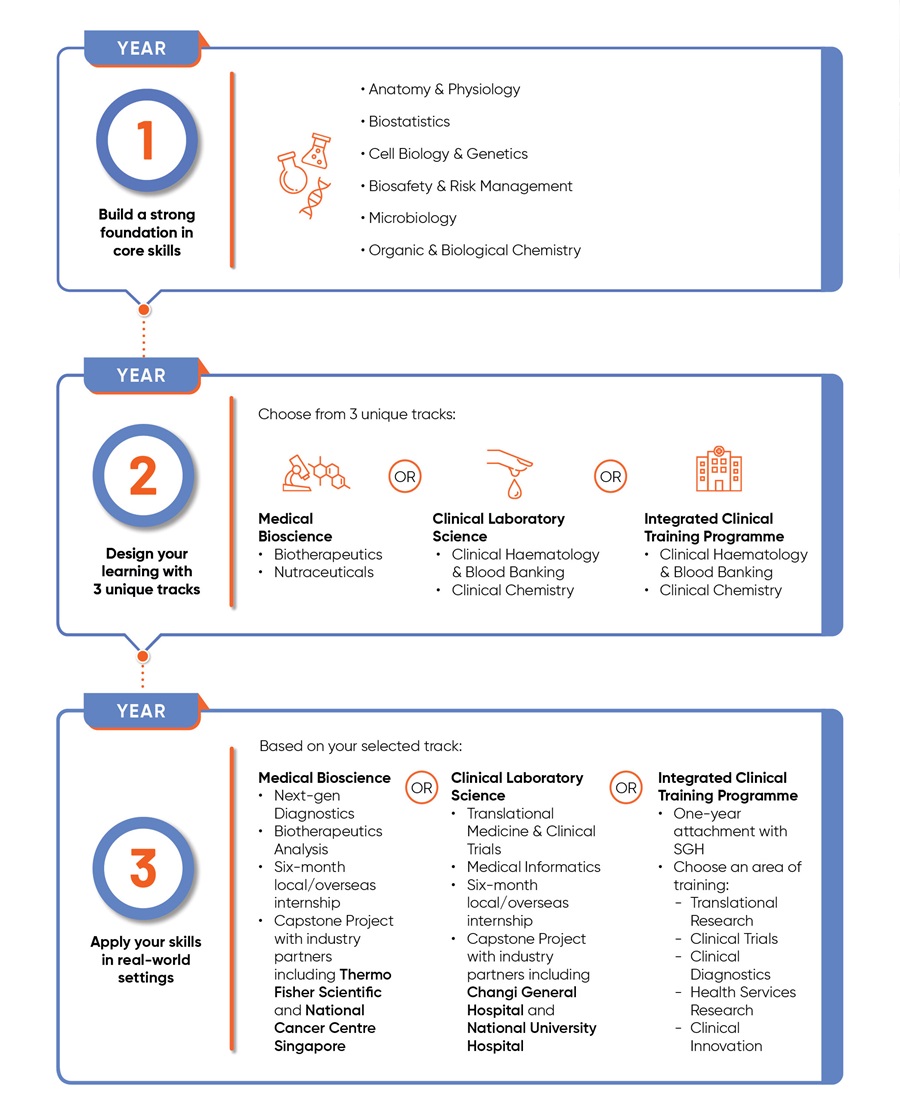
Highlights
From BMS to Medical School
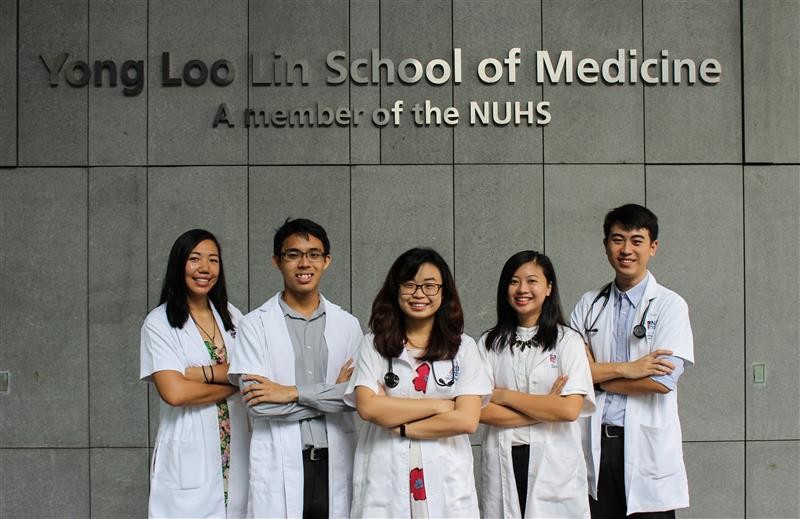
To date, 54 LSCT graduates have made it to National University of Singapore’s Yong Loo Lin medical school and Nanyang Technological University’s Lee Kong Chian medical school.
Impactful Internships
Further Studies
More than 80% of our graduates go on to National University of Singapore, Nanyang Technological University, Singapore Management University, Singapore Institute of Technology and Singapore University of Social Sciences every year.
With your foundation in BMS, you will be well-prepared to pursue degrees in various fields including Medicine, Dentistry, Life Science, Pharmaceutical Science, and more. You may also be granted module exemptions and up to two years of advanced standing to fast-track your degree and reduce study time at the following overseas universities:
Australia
- Australian National University
- Murdoch University
- Queensland University of Technology
- RMlT University
- The University of Adelaide
- The University of Melbourne
- The University of Queensland
- The University of Sydney
- The University of Western Australia
- University of New South Wales
- University of Technology Sydney
New Zealand
- The University of Auckland
United Kingdom
- Queen’s University Belfast
- University of Dundee
- University of Leeds
- University of Liverpool
- The University of Edinburgh
- The University of Manchester
Industry Partners

Careers
With your versatile BMS diploma, you will have a wide range of career options:
- Assistant Biotechnologist
- Associate Clinical Innovation Engineer
- Assistant Data Analyst
- Clinical Trial Assistant
- Laboratory Analyst
- Laboratory Technologist
- Medical Laboratory Scientist
- Medical Technologist
- Quality Assurance Executive
- Quality Control Analyst
- Research Assistant
- Research Technologist
- Sales & Marketing Executive
Entry Requirements
AGGREGATE TYPE ELR2B2-C
To be eligible for consideration, candidates must have the following GCE ‘O’ Level examination (or equivalent) results.
| Subject | 'O' Level Grade |
|---|---|
| English Language | 1-7 |
| Additional Mathematics/Mathematics | 1-6 |
| Any one of following subjects: Biology Biotechnology Chemistry Food & Nutrition / Nutrition & Food Science Physics Science (Chemistry, Biology) Science (Physics, Biology) Science (Physics, Chemistry) | 1-6 |
Applicants must also fulfil the aggregate computation requirements for the ELR2B2-C Aggregate Type ( English Language, 2 relevant subjects and 2 other best subjects) listed at www.np.edu.sg/docs/ELR2B2.pdf.
For students with other qualifications, please refer to the NP website for the entry requirements and admissions exercise period.
What You Will Learn
Mathematics (3 Credit Units)
This module provides students with a fundamental analytical knowledge of mathematics essential for the study of biomedical and pharmaceutical science. Students will learn the concepts of functions, exponential and logarithmic functions, differentiation and its applications, integration and its applications, and differential equations.
Cell Biology & Genetics (4 Credit Units)
This module explores mammalian cells, tissue and organ systems. Topics include the fundamental chemicals of life, structure and function of cellular organelles, membrane trafficking, cell cycle and division, study of genes, genetic variation and heredity.
Biosafety & Risk Management (4 Credit Units)
This module offers a comprehensive introduction to the fundamental principles and methods of biosafety and biosecurity. The objective is to provide students with the necessary knowledge regarding biosafety practices specifically within laboratory environments. The module covers important topics such as risk evaluation, identification of risk groups, and safe handling of biohazardous materials and chemical waste.. As part of risk management, students will receive BizSAFE 2 training, focusing on developing a Risk Management Implementation Plan. By completing BizSAFE 2 training, students will be equipped with the necessary tools to effectively manage risks.
Inorganic & Physical Chemistry (4 Credit Units)
The principles of physical chemistry, inorganic compounds and their reactions are presented to provide sufficient background knowledge and understanding of chemistry required for other subjects taught in the Biomedical Science diploma course. The module covers the structure of matter, electronic structure, stoichiometry, periodic table chemical bonding, redox reactions, thermochemistry, kinetics, chemical equilibrium, and chemistry of solutions, including acids, bases and buffers.
Career & Professional Preparation I (1 Credit Unit)
This first-year module gives students a foundational introduction to their three-year diploma course curriculum and how it prepares them for industry. It will help them embark on their course with the end in mind. This is achieved through guided reflection of their personal characteristics and the development of an overall game plan for their education and career goals. The module aims to deepen students’ commitment to the sector that the course prepares them for.
Innovation Made Possible^ (3 Credit Units)
English Language Express* (Credit Units - NA)
English Language Express aims to give you a better grounding in the English Language and to strengthen the written and oral communications skills that you will need in your academic and professional careers. You will be engaged in writing, reading, listening and speaking activities that will develop your ability to speak and write grammatically, coherently and clearly. You will also hone your reading and listening comprehension skills.
Biostatistics (3 Credit Units)
This is an introductory biostatistics module that provides students the basic skills to analyse and interpret simple biological data as well as how to present data using Microsoft Excel. Students learn how to summarise data using a combination of graphical
representation, tabulated description and descriptive statistics. Introductory topics for exploratory data analysis and statistical inference are also covered: sampling strategies and errors, cluster analysis, scatter plots and regression analysis
for linear data.
Microbiology (4 Credit Units)
This module provides a strong foundation for second- and third-year Biomedical Science modules. It equips students with an understanding of microorganisms and techniques in microbiology. Topics include cell structure and function, classification, viruses and fungi, nutrition, growth and regulation, environmental factors affecting growth, microscopy, staining, cell enumeration, media preparation, isolation and cultivation of pure cultures.
Organic and Biological Chemistry (4 Credit Units)
The Organic and Biological Chemistry module offers a comprehensive understanding of organic chemistry principles and their applications in addressing environmental challenges. Students will explore the diverse range of organic compounds, their structure, bonding, nomenclature, and the properties of functional groups. Emphasis is placed on the reactivity and transformations of functional groups in organic synthesis, as well as their environmental impact. The module examines the sources, fate, and behaviour of organic pollutants in the environment, emphasizing the need for sustainable and green chemistry practices. Students will learn about eco-friendly chemical processes that minimize waste, reduce energy consumption, and utilize renewable resources. Hands-on laboratory sessions reinforce theoretical concepts and include organic synthesis techniques, such as solvent-less reactions and the use of renewable feedstocks. Overall, the module equips students with a solid foundation in organic chemistry and an understanding of the importance of sustainable practices in protecting the environment.
Anatomy & Physiology (3 Credit Units)
This module equips students with an understanding of the basic principles of homeostatic mechanisms and the cardiovascular, respiratory, renal, gastrointestinal, neuromuscular, endocrine and reproductive physiological systems that exist in the human body. It also covers basic skeletal system and anatomy.
Confident Communication: Find Your Voice (VOICE)^ (3 Credit Units)
The VOICE module aims to empower students to become thoughtful and confident communicators able to tailor a message to suit audience, purpose and context. Students will learn how to use storytelling structures and techniques, persuasive strategies and effective visuals to connect meaningfully with their audience. Through a personalised growth plan, the module encourages students to reflect, set goals and take ownership of their growth and development as communicators. The module employs engaging teaching strategies such as games, thinking routines, masterclasses and workshops, and a celebratory showcase festival at the end to make learning fun and exciting.
Health & Wellness (1 Credit Unit)
This is a Level 1 Core module for all Year 1 students. The module will introduce students to the importance of maintaining both physical and mental health through the knowledge and monitoring
of health indicators, and application through appropriate exercises. The aim of the module is to empower students with basic knowledge and skills to be independent and responsible in maintaining overall personal health.
Applied Microbiology (5 Credit Units)
This is an advanced course in microbiology for second year students. This module forms a continuation of the basic microbiology module, which teaches the fundamental nature, and properties of microorganisms, in the first year. The module focuses on microbiological contamination control in the pharmaceutical and food industries. Students will learn the characteristics and issues presented by the key objectionable microorganisms, how contamination can be detected, prevented and controlled and how Good Manufacturing Practices are applied to prevent contamination. In laboratory classes, students will develop skills in standard analytical microbiological methods as applied in the food and pharmaceutical sectors. Students will also be introduced to related food sustainability issues such as production of alternative proteins utilizing microbes through fermentation process.
Biochemistry (5 Credit Units)
This module introduces the fundamentals of biochemical concepts and the essentials of biomolecules present in human body associated with various major metabolic pathways. The importance of the integration of these major metabolic pathways will be discussed to illustrate how these interactions can lead to normal functioning of human body.
Career & Professional Preparation II (2 Credit Units)
This module is part of the Education and Career Guidance framework to provide students with the tools and resources necessary for their further career and/or education. In this module, students will explore basic job search strategies, practise writing effective resumes and cover letters, and learn interview skills. Students will also learn professional and intercultural communication skills to prepare them for a dynamic and diverse workplace.
Molecular Biology & Bioinformatics (5 Credit Units)
This module covers topics in Molecular Biology and Bioinformatics. Topics include regulation of gene expression, gene mutation and DNA repair mechanisms. In the area of recombinant DNA and molecular techniques, students will learn about nucleic acid isolation, polymerase chain reaction (PCR), DNA cloning, identification of recombinant clones, DNA sequencing and microarrays. Students will also be introduced to computational approaches and bioinformatics tools that can be used for the analysis of nucleic acid and protein sequences.
World Issues: A Singapore Perspective^ (2 Credit Units)
Choose one of three options: (4 Credit Units)
Medical Bioscience Track:
Biotherapeutics
This module provides an in-depth understanding of biotherapeutics, including the development, production, and application of therapeutic agents such antibodies, cell therapies, gene therapies, vaccines and recombinant proteins. Topics covered include the principles of biotechnology and molecular biology that underpin biotherapeutic development, with a focus on real-world applications and industry practices.
Clinical Laboratory Science Track:
Clinical Haematology & Blood Banking
This module offers comprehensive coverage of clinical haematology and blood banking practices. It focuses on the study of blood and blood-forming tissues, the diagnosis and management of blood disorders, and the principles and practices of blood transfusion services. Students will gain both theoretical knowledge and practical skills essential for working in clinical laboratories and blood banks.
Integrated Clinical Training Programme Track:
Clinical Haematology & Blood Banking
This module provides comprehensive coverage of clinical haematology and blood banking practices. Students will focuses on the study of blood and blood-forming tissues, the diagnosis and management of blood disorders, and the principles and practices of blood transfusion services. Students will gain both theoretical knowledge and practical skills essential for working in clinical laboratories.
Analytical Chemistry (4 Credit Units)
Building on the foundation of Inorganic and Physical Chemistry as well as Organic chemistry taught in year 1, students will continue to practice and deepen their knowledge in calculations related to quantitation of chemicals and reagents. This module covers various instruments which are used in analytical chemistry with the emphasis on their practical applications. Students will study the workings of the UV-Vis, gas chromatography, reverse-phase HPLC, ion exchange chromatography, GC-MS, and LC-MS. This module will also cover key concepts in assay development and validation.
Applied Biostatistics (3 Credit Units)
This module covers advanced statistical skills to analyze and interpret a wide range of biological, pre-clinical and clinical data, and preparation of data for scientific presentation. The statistical skills covered are biological experiment design, hypothesis testing, quantitative data analysis using parametric and non-parametric inferential statistical tests, qualitative data analysis using McNemar and Fisher exact tests. In addition, multiple & non-linear regression analyses are covered to understand relationship between X and Y variables.
Cell & Tissue Culture Applications (5 Credit Units)
The Cell & Tissue Culture Applications module provides an in-depth study of the principles, techniques, and applications of cell and tissue culture in biomedical research and biotechnology. This course covers the methodologies for culturing various cell types, including primary cells and established cell lines, as well as the maintenance and manipulation of tissues. Emphasis is placed on the practical aspects of cell and tissue culture, including aseptic techniques, media preparation, and advanced applications in research and industry.
Immunology (4 Credit Units)
This module introduces students to the fundamentals of immunology and provides an understanding of how the immune system functions as an integrated defence system against disease. Topics include an overview of the immune system, innate and adaptive immunity, vaccination, immunological techniques and the diseases of the immune system. Students have the opportunity to perform immunological techniques during practical sessions and design experiments to address a research problem.
Choose one of three options: (4 Credit Units)
Medical Bioscience Track:
Nutraceuticals
The Nutraceuticals module provides a comprehensive examination of the role of food-derived products in promoting health and preventing disease. It covers the science behind nutraceuticals, including their sources, bioactive compounds, mechanisms of action, and health benefits. The module also addresses the regulatory landscape, safety considerations, and the and the emerging trends in the industry.
Clinical Laboratory Science Track:
Clinical Chemistry
This module provides a comprehensive understanding of laboratory medicine fundamentals, encompassing both basic and advanced concepts in diagnostic testing within healthcare settings. Through this module, students will develop a thorough understanding of laboratory principles and diagnostic methodologies, gaining the essential knowledge needed to analyze clinical specimens and interpret test results in the context of patient care and disease management.
Integrated Clinical Training Programme Track:
Clinical Chemistry
This module provides a comprehensive exploration of the principles, methodologies, and applications of biochemical analyses used in medical diagnostics. This module covers the theoretical the techniques necessary to evaluate, interpret chemical and biochemical data from body fluids, with a focus on their relevance to disease states and medical conditions.
Medical Bioscience Track:
Capstone Project (8 Credit Units)
This module provides an opportunity for students to apply the knowledge and skills acquired throughout their coursework to a comprehensive, independent research project. Students will engage in all stages of the research process, from hypothesis formulation and experimental design to data collection, analysis, and presentation of findings. The Capstone Project emphasizes critical thinking, problem-solving, and effective communication, preparing students for professional practice or further academic pursuits.
Biotherapeutics Analysis (4 Credit Units)
The Biotherapeutics Analysis module provides an in-depth exploration of the analytical techniques and methodologies used in the development, characterization, and quality control of biotherapeutic products. The module focuses on the principles and applications of various analytical tools to ensure the safety, efficacy, and quality of biotherapeutics, including therapeutic proteins, monoclonal antibodies, cell and gene therapies.
Next-Generation Diagnostics (4 Credit Units)
This module provides an in-depth exploration of next-generation diagnostic technologies and methodologies. Students will learn about cutting-edge advancements in molecular biology, genomics, and bioinformatics that are revolutionizing the field of diagnostics. The course covers the principles, applications, and implications of these technologies emphasizing their role in improving disease detection, monitoring, and personalized medicine.
Project ID: Connecting the Dots^ (4 Credit Units)
Clinical Laboratory Science Track:
Capstone Project (8 Credit Units)
This module provides an opportunity for students to apply the knowledge and skills acquired throughout their coursework to a comprehensive, independent research project. Students will engage in all stages of the research process, from hypothesis formulation and experimental design to data collection, analysis, and presentation of findings. The Capstone Project emphasizes critical thinking, problem-solving, and effective communication, preparing students for professional practice or further academic pursuits.
Translational Medicine and Clinical Trials (4 Credit Units)
The Translational Medicine and Clinical Trials module provides an in-depth exploration of the process of translating biomedical research into clinical practice through rigorous clinical trials. This course focuses on understanding the continuum from basic scientific discovery to clinical application, emphasizing the principles, methodologies, and ethical considerations involved in conducting clinical trials. Students will examine the regulatory frameworks, design and implementation of clinical trials, data management, and the role of translational research in advancing healthcare.
Medical Informatics (4 Credit Units)
The Medical Informatics module provides a comprehensive exploration of the application of information technology in healthcare systems. This module examines the integration of technology, data analytics, and clinical informatics to improve healthcare delivery, patient outcomes, and operational efficiency. Students will gain insights into electronic health records (EHRs), and the ethical and legal aspects of health informatics.
Project ID: Connecting the Dots^ (4 Credit Units)
Integrated Clinical Training Programme Track:
Integrative Module I (16 Credit Units)
The module covers the fundamental concepts and practices of Translational Research, Clinical Trials, Clinical Diagnostics, Clinical Innovation and Health Research Services. Students will learn about the various stages involved in Translational Research, Clinical Trials, Clinical Innovation, Health Research Services and the role of Clinical Diagnostics in disease diagnosis. Students will practice what they have learned in their lectures through hands on training at Singapore General Hospital. Upon completion of the module, students will have a comprehensive understanding of the topics as well how they are related and play a critical role in advancing medical research and improving patient outcomes.
Project ID: Connecting the Dots^ (4 Credit Units)
Medical Bioscience Track:
6-Month Internship (Local/Overseas) (20 Credit Units)
This module comprises of a six-month (22 weeks) internship attachment at research institutes or companies in various industries such as biotechnology, pharmaceuticals, and biologics. Through internships, students will be given opportunities to relate and apply the knowledge acquired in classrooms to work situations and in research. Students will also have the opportunity to go for overseas internships.
Clinical Science Laboratory Track:
6-Month Internship (Local/Overseas) (20 Credit Units)
This module comprises of a six-month (22 weeks) internship attachment at research institutes or companies in various industries such as biotechnology, pharmaceuticals, and biologics. Through internships, students will be given opportunities to relate and apply the knowledge acquired in classrooms to work situations and in research. Students will also have the opportunity to go for overseas internships.
Integrated Clinical Training Programme Track:
Integrated Module II (20 Credit Units)
The module covers Artificial Intelligence (AI) in clinical science. Students will have a choice to complete a project using AI in either translational research, clinical Trials, clinical diagnostics, clinical Innovation or health research services using design thinking. Students will be able to integrate and apply the knowledge and skills learned from the course. Students will continue their hands-on training from Integrative Module I at Singapore General Hospital.

